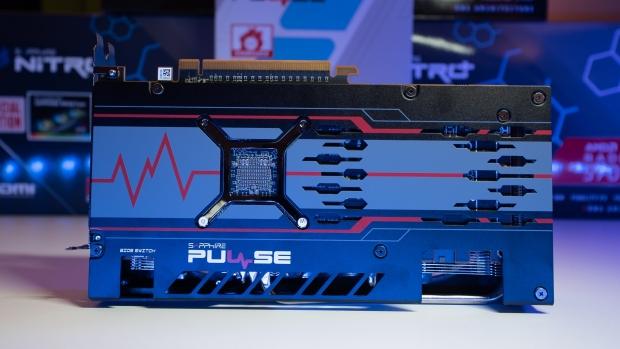
The Bottom Line
Introduction
Note: SAPPHIRE could not help the new BIOS or last-minute changes from AMD. I hold no ill feelings towards SAPPHIRE for that, as it was all AMD. I'm not going to punish SAPPHIRE or AMD in my final charts, but it will make it into the bottom line of this review. AMD -- learn from this, you're hurting AIB partners and gamers and haven't even really apologized for this gigantic cock up. You jebaited yourselves.
AMD had one of the most, if not the most troubled launch of a graphics card ever with its new Radeon RX 5600 XT -- and while I won't bore you with that here, I have written an entire article about it here.
When AMD sampled the press for the Radeon RX 5600 XT, they sent out the SAPPHIRE Radeon RX 5600 XT PULSE OC which I'm reviewing here today. I tested the card twice over, once with the stock BIOS and again with the new BIOS. This unlocks a huge chunk of GPU clock speed, and ups the 6GB of GDDR6 from 12Gbps of bandwidth, to 14Gbps.
I included both results in my benchmark charts so you can get a great look at what AMD wanted to give gamers originally, and what gamers will get once they buy the cards with the new BIOS installed. The Radeon RX 5600 XT was a good card before the new BIOS, but NVIDIA's price cut on the GeForce RTX 2060 has forced AMD to ramp up the Radeon RX 5600 XT and make it an even better offering.
So much so, that the Radeon RX 5600 XT could annihilate any need to buy the higher-end Radeon RX 5700 as the only silver lining in buying that card now will be the additional VRAM. AMD ships the Radeon RX 5600 XT with 6GB of GDDR6, while the higher-end Radeon RX 5700 packs 8GB of GDDR6.
You'll see later on in this re view just how close the now-tweaked SAPPHIRE Radeon RX 5600 XT PULSE OC gets to the reference Radeon RX 5700, because it is real close at times.
Pricing
AMD has released its new Radeon RX 5600 XT immediately, starting at $279. There are a bunch of custom models on the market from ASRock, ASUS, GIGABYTE, MSI, PowerColor, SAPPHIRE, and XFX. SAPPHIRE tacks on $10 more for its custom Radeon RX 5600 XT PULSE OC graphics card.

| Today | 7 days ago | 30 days ago | ||
|---|---|---|---|---|
| Loading... | Loading... | |||
|
* Prices last scanned on 10/26/2024 at 10:49 am CDT - prices may not be accurate, click links above for the latest price. We may earn an affiliate commission from any sales.
|
||||
Detailed Specs
Here we have the skinny on the SAPPHIRE Radeon RX 5600 XT PULSE OC graphics card, with all of the updated (new BIOS) technical specifications. This means we have the boost GPU clock up to 1750MHz and the 6GB of GDDR6 at 14Gbps.
The SAPPHIRE Cool Tech here is actually pretty kick ass, as it keeps the SAPPHIRE Radeon RX 5600 XT PULSE OC nice and cool during hectic game loads. My review sample ran at just 58C after the BIOS flash, making it the coolest graphics card I've tested so far -- but it did have its fans ramped up a bit faster than the old BIOS.
You've got all the usual Radeon goodness here on top of that, with Radeon FreeSync and Radeon Image Sharpening, just to name a few.
Cooling Tech
SAPPHIRE uses its Dual-X cooler on the Radeon RX 5600 XT PULSE OC graphics card, which is a dual-fan cooler that is nice and quiet during those all-night gaming sessions -- but also nice and cool, too.
The Dual-X cooling technology SAPPHIRE uses keeps the Navi GPU, GDDR6, and VRMs nice and cool with my testing before the BIOS update resulting in 66C temperatures under 30 minutes of 4K benchmarking on Heaven. But after updating the BIOS the fan curve increases, which doesn't result in much more noise at all -- but reduces those temps to just 58C. Very cool indeed, if you'll pardon the pun.
Not only does SAPPHIRE's in-house Dual-X cooling technology perform well, but the card itself looks great as well.
Detailed Look
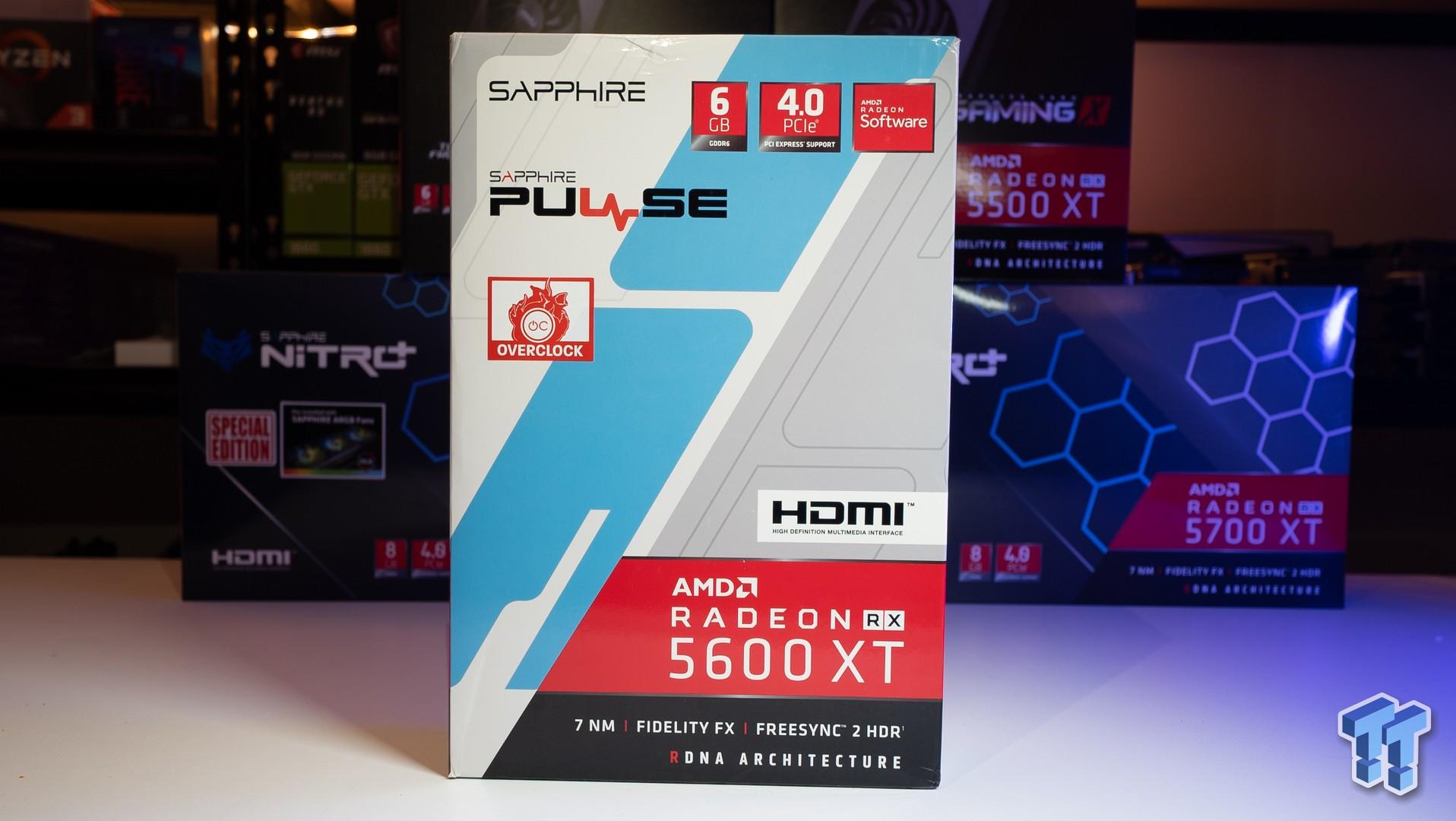
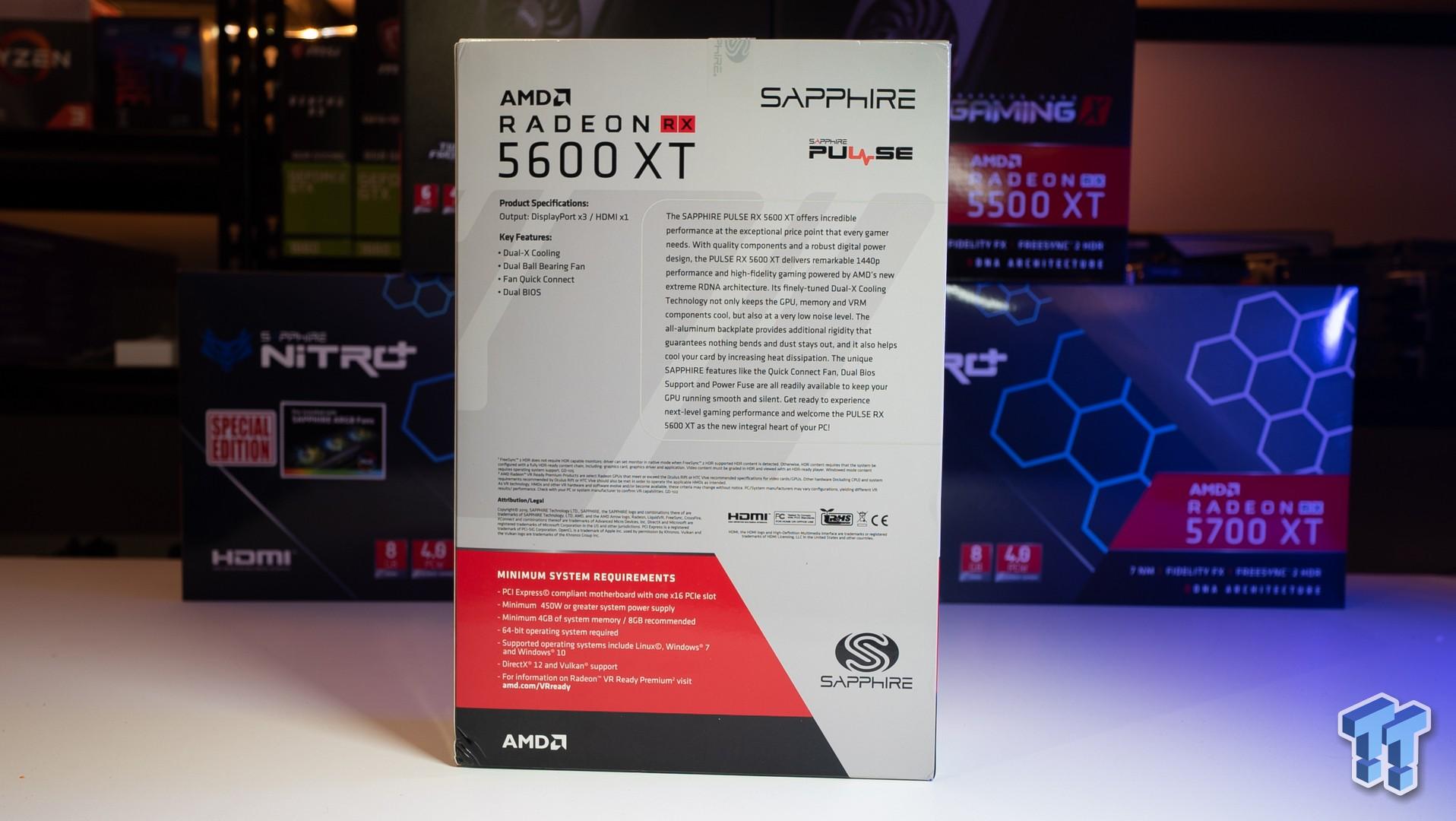
The retail packaging is identical to other members of SAPPHIRE's ever-expanding PULSE family of graphics cards, with the new SAPPHIRE Radeon RX 5600 XT PULSE OC packaging having a similar design to the card itself.
Here we have SAPPHIRE's new Radeon RX 5600 XT PULSE OC graphics card from the front, showing off its dual-fan Dual X cooler.
I'm a huge fan of the backplate SAPPHIRE uses on its PULSE branded graphics cards, so for a mid-range graphics card here with the Radeon RX 5600 XT you're not getting something that looks cheap. The back of this card looks baller in a gaming PC.
The card from the bottom, where you can see it is a dual-slot card.
Once again from the top, showing off the heat sink array next to the PCIe power connector.
Speaking of the PCIe power connector, you'll need just a single 8-pin PCIe power connector to power the SAPPHIRE Radeon RX 5600 XT PULSE OC graphics card.
Test System Specs
GPU Test Rig Specs
Welcome to the latest revision of our GPU test bed, with our system being upgraded from the Intel Core i7-7700K to the Core i7-8700K. The CPU is cooled by the Corsair H115i PRO cooler, with the 8700K overclocked to 5GHz. We've stayed with GIGABYTE for our motherboard with their awesome Z370 AORUS Gaming 7.
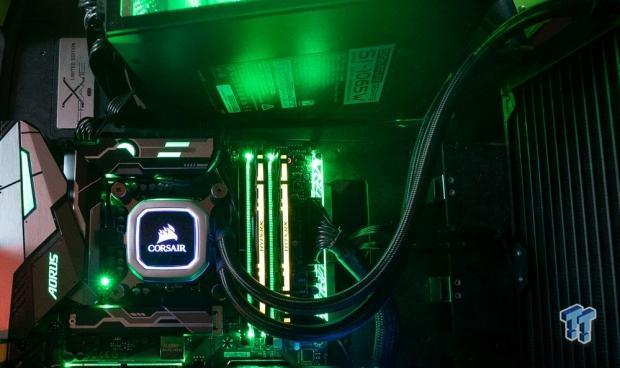
We approached our friends at HyperX for a kit of their kick ass HyperX Predator DDR4-2933MHz RAM (HX429C15PB3AK4/32), with 2 x 8GB sticks for a total of 16GB DDR4-2933. The RAM stands out through every minute of our testing as it has beautiful RGB lights giving the system a slick look while benchmarking our lives away, while the Z370 AORUS Gaming 7 motherboard joins in with its own array of RGB lighting.
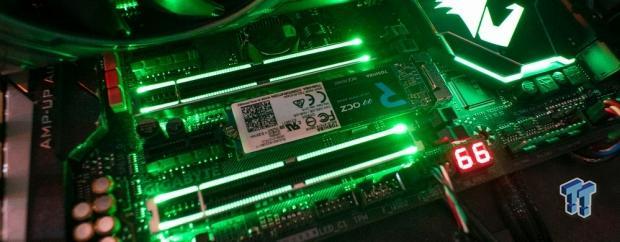
Detailed Tech Specs
- CPU: Intel Core i7-8700K @ 5GHz
- Cooler: Corsair Hydro Series H115i PRO
- MB: Z370 AORUS Gaming 7
- RAM: 16GB (2x8GB) HyperX Predator DDR4-2933
- SSD: 1TB OCZ RD400 NVMe M.2
- SSD: 512GB OCZ RD400 NVMe M.2
- PSU: InWin 1065W PSU
- Chassis: In Win X-Frame
- OS: Windows 10 Pro x64
Additional Images
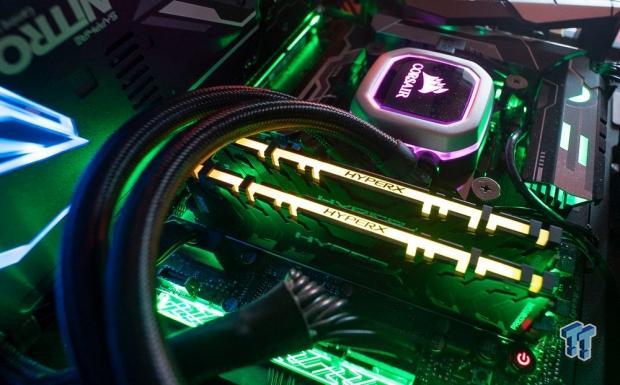
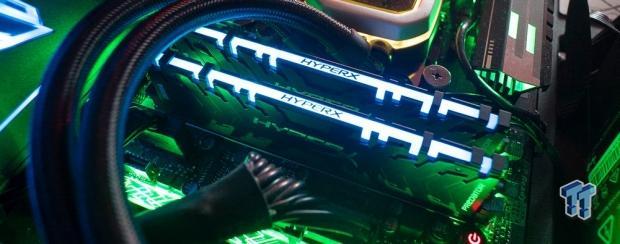
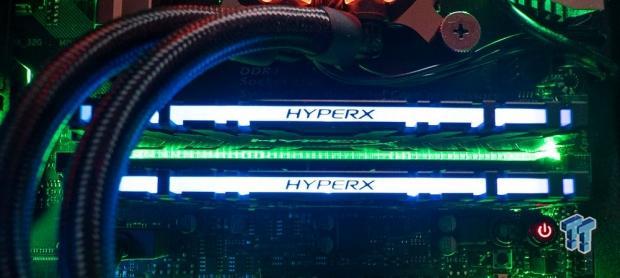
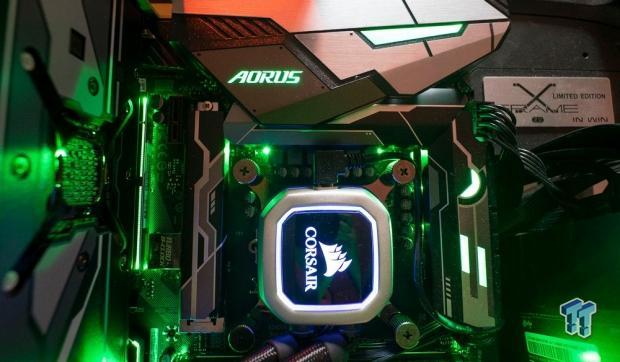
Benchmarks - Synthetic
3DMark Fire Strike - 1080p
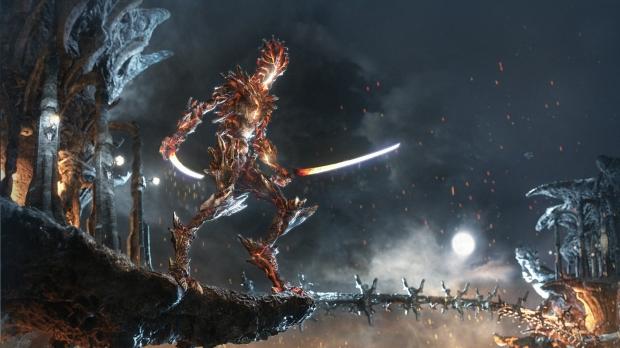
3DMark has been a staple benchmark for years now, all the way back to when The Matrix was released and Futuremark had bullet time inspired benchmarks. 3DMark is the perfect tool to see if your system - most important, your CPU and GPU - is performing as it should. You can search results for your GPU, to see if it falls in line with other systems based on similar hardware.
3DMark Fire Strike - 1440p
3DMark has been a staple benchmark for years now, all the way back to when The Matrix was released and Futuremark had bullet time inspired benchmarks. 3DMark is the perfect tool to see if your system - most important, your CPU and GPU - is performing as it should. You can search results for your GPU, to see if it falls in line with other systems based on similar hardware.
3DMark Fire Strike - 4K
3DMark has been a staple benchmark for years now, all the way back to when The Matrix was released and Futuremark had bullet time inspired benchmarks. 3DMark is the perfect tool to see if your system - most important, your CPU and GPU - is performing as it should. You can search results for your GPU, to see if it falls in line with other systems based on similar hardware.
3DMark TimeSpy
3DMark TimeSpy Extreme
Heaven - 1080p
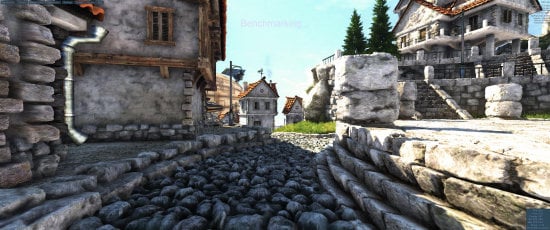
Heaven is an intensive GPU benchmark that really pushes your silicon to its limits. It's another favorite of ours as it has some great scaling for multi-GPU testing, and it's great for getting your GPU to 100% for power and noise testing.
Heaven - 1440p
Heaven - 4K
Benchmarks - 1080p
1080p Benchmarks
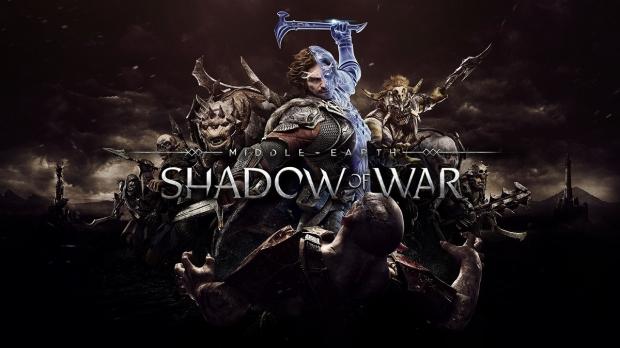
Middle-earth: Shadow of War is a sequel to the popular Shadow of Mordor, which was powered by the Lithtech engine. When cranked up to maximum detail, it will chew through your GPU and its VRAM like it's nothing.
You can buy Middle-earth: Shadow of War at Amazon.
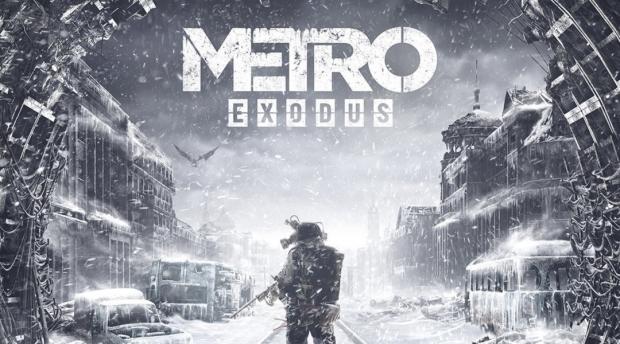
Metro Exodus is one of the hardest tests that our graphics cards have to go through, with 4A Games' latest creation being one of the best looking games on the market. It is a serious test that pushes GPUs to their limits, and also features RTX technologies like DLSS.

Far Cry New Dawn was developed by Ubisoft, and is powered the Dunia Engine, an engine that has been modified over the years for Far Cry and last used in Far Cry 5. Dunia Engine itself was a modified version of CRYENGINE, scaling incredibly well on all sorts of hardware.

Shadow of the Tomb Raider is one of the latest games to join our graphics card benchmark lineup, with the game built using the Foundation engine as a base, the same engine in Rise of the Tomb Raider. Eidos Montreal R&D department made lots of changes to the engine during the development of Shadow of the Tomb Raider to make it one of the best-looking games out right now.
1080p Benchmark Performance Thoughts
This is where you'll be buying the Radeon RX 5600 XT -- 1080p gaming. In VRAM heavy games like Shadow of War we can see just how big the increase in performance is with AMD's last-minute BIOS changes seeing the SAPPHIRE RX 5600 XT PULSE OC going from 82FPS average and losing to the GTX 1660 Ti and GTX 1660 SUPER -- to 96FPS average and nipping on the heels of the RTX 2060 and Vega 56.
The same goes for Metro Exodus, where before the BIOS the SAPPHIRE RX 5600 XT PULSE OC was losing to the Vega 56 and RTX 2060 but then after the BIOS update it was equal to the Vega 64 and just 3FPS shy of beating the RX 5700.
Far Cry New Dawn is pretty damn good with most cards nearly hitting 100FPS, but Shadow of the Tomb Raider sees the SAPPHIRE RX 5600 XT PULSE OC pushing past 100FPS average and coming in either side of the Vega 56 and Vega 64 graphics cards.
Benchmarks - 1440p
1440p Benchmarks

Middle-earth: Shadow of War is a sequel to the popular Shadow of Mordor, which was powered by the Lithtech engine. When cranked up to maximum detail, it will chew through your GPU and its VRAM like it's nothing.
You can buy Middle-earth: Shadow of War at Amazon.

Metro Exodus is one of the hardest tests that our graphics cards have to go through, with 4A Games' latest creation being one of the best looking games on the market. It is a serious test that pushes GPUs to their limits, and also features RTX technologies like DLSS.

Far Cry New Dawn was developed by Ubisoft, and is powered the Dunia Engine, an engine that has been modified over the years for Far Cry and last used in Far Cry 5. Dunia Engine itself was a modified version of CRYENGINE, scaling incredibly well on all sorts of hardware.

Shadow of the Tomb Raider is one of the latest games to join our graphics card benchmark lineup, with the game built using the Foundation engine as a base, the same engine in Rise of the Tomb Raider. Eidos Montreal R&D department made lots of changes to the engine during the development of Shadow of the Tomb Raider to make it one of the best-looking games out right now.
1440p Benchmark Performance Thoughts
I wouldn't recommend the Radeon RX 5600 XT for 1440p gamers, but if you were playing esports games like Overwatch and Apex Legends then you will have a blast -- for AAA games? If you turned down the details then sure, but for benchmark purposes I run everything maxed out on Ultra graphics (with AA and motion blur disabled).
Starting with Shadow of War we have 60FPS only with the new BIOS -- where the old BIOS saw the SAPPHIRE RX 5600 XT PULSE OC dropping to 54FPS. Shadow of War is hard on graphics cards and even harder as the resolution goes up. We can see that the Vega 56/64 here dominate the RX 5600 XT, and so too does the now $299 priced GeForce RTX 2060.
Metro Exodus performs much better with the new BIOS at 49FPS average, equaling the Vega 64 and 1FPS shy of the RTX 2060. Far Cry New Dawn is super-playable at 89FPS average and keeping up with the RTX 2060, while Shadow of the Tomb Raider is still pumping out over 60FPS which makes it an enjoyable experience.
Benchmarks - 4K
4K Benchmarks

Middle-earth: Shadow of War is a sequel to the popular Shadow of Mordor, which was powered by the Lithtech engine. When cranked up to maximum detail, it will chew through your GPU and its VRAM like it's nothing.
You can buy Middle-earth: Shadow of War at Amazon.

Metro Exodus is one of the hardest tests that our graphics cards have to go through, with 4A Games' latest creation being one of the best looking games on the market. It is a serious test that pushes GPUs to their limits, and also features RTX technologies like DLSS.

Far Cry New Dawn was developed by Ubisoft, and is powered the Dunia Engine, an engine that has been modified over the years for Far Cry and last used in Far Cry 5. Dunia Engine itself was a modified version of CRYENGINE, scaling incredibly well on all sorts of hardware.

Shadow of the Tomb Raider is one of the latest games to join our graphics card benchmark lineup, with the game built using the Foundation engine as a base, the same engine in Rise of the Tomb Raider. Eidos Montreal R&D department made lots of changes to the engine during the development of Shadow of the Tomb Raider to make it one of the best-looking games out right now.
4K Benchmark Performance Thoughts
This is where the Radeon RX 5600 XT is punished the most, at 4K -- where starting with Shadow of War it is pumping out just 35FPS which loses to the GTX 1660 Ti and GTX 1660 SUPER graphics cards.
Metro Exodus sees the SAPPHIRE Radeon RX 5600 XT PULSE OC managing just 30FPS average, which is actually equal to the Radeon RX 5700 -- an impressive feat. Far Cry New Dawn is actually not too bad at 48FPS average, so with some detail tweaks you could easily hit 60FPS average, while Shadow of the Tomb Raider manages just 40FPS powered by the RX 5600 XT at 4K.
Thermals & Power
Thermals
Thanks to AMD changing things just before the launch, I'm going to split the results in the charts for temperature of the card on the old BIOS and the new BIOS. SAPPHIRE tweaked the GPU frequency, GDDR6 clocks, and the fan speed curves as well which results in not just a faster operating card, but a cooler one.
Before I updated the BIOS the card was running at 66C with a peak of 67-68C, while the GPU was clocked at 1620MHz and the VRAM at 1500MHz. SAPPHIRE had the fan speed sitting at around 800RPM (24%) but once the new BIOS was installed the GPU frequency leaps up by 100MHz to 1720MHz or so, GDDR6 cranks up to 1750MHz, and the fan speed up to 1200RPM (40%) -- but the GPU temps dropped down from 66C to just 58C, a very big difference.
Power Consumption
You won't be needing a new PSU if you buy the Radeon RX 5600 XT, with my entire Intel Core i7-8700K rig using less than 200W under full 4K benchmark loads. The old BIOS was 10W better at 190W total, while under the new BIOS the power consumption of the entire system ramped up to 200W.
Final Thoughts
For my first two custom Radeon RX 5600 XT reviews I kept in both the old and new BIOS results, so you get the totally unbiased, totally transparent look into the RX 5600 XT. This gives you the ultimate jebait review, so you can see what AMD had planned for you as a consumer before NVIDIA dropped the GeForce RTX 2060 price.
Once NVIDIA did that, AMD reacted by unleashing the Radeon RX 5600 XT and while it might only be by 10% on the TDP, the GDDR6 being shifted up and the GPU clocks ramped means it is a much, much better card. So much so that it will most likely end up cannibalizing the Radeon RX 5700 -- not a good thing for AMD, but a good thing for you, the consumer.
AMD has positioned the new Radeon RX 5600 XT pretty damn well, but with the increased 10W on the TBP it allows the card to clock higher and thus perform better. We're looking at performance that is edging on the Radeon RX 5700, which can be found on Amazon for $319 at the time of writing.
SAPPHIRE steps in with its custom Radeon RX 5600 XT PULSE OC and comes very close to the Radeon RX 5700 in most tests, especially when the new BIOS was installed. This is why I kept both the results in of the old and new BIOSes, so you can see just how much more ass kicking the Radeon RX 5600 XT can do.
I thought I'd leave in the GeForce GTX 1080 Ti which is now many years old, so you can see firstly -- the GTX 1080 Ti up against the new RTX 2000 series cards, but the GTX 1080 Ti up against the new Radeon RX 5600 XT. You could buy a GTX 1080 Ti on the cheap second hand in 2020, and it's still a kick ass card.
Even in a VRAM intensive game like Shadow of War, the GTX 1080 Ti was released in 2017 and is still a great graphics card -- offering up 127FPS average in Shadow of War at 1080p, compared to just 96FPS from the new RX 5600 XT. The GTX 1080 Ti beats the RX 5600 XT in every single test and every single resolution.
What AMD is effectively doing here iwth the new mid-range Radeon RX 5600 XT is offering all of the improvements of the RDNA architecture and GDDR6 memory to offer up a much cooler, much quieter, and overall smoother experience that it had with the Radeon RX Vega 56 and Radeon RX Vega 64 graphics cards.
In virtually all tests, AMD's new Radeon RX 5600 XT either falls just behind, equals, or beats the HBM2-powered Vega-based graphics cards. If you look at the temperature charts on the previous page of this review, the new Navi-based RX 5600 XT also runs much cooler, too.
All-in-all, AMD offers one of the better Navi-based offerings with its new Radeon RX 5600 XT. A kick ass mid-range graphics card that will dominate 1080p gaming, and with the new BIOS it is a fine competitor to the GeForce RTX 2060. On top of that, the RX 5600 XT punches above its weight with the new BIOS and comes close to the more-expensive Radeon RX 5700... so AMD has shot itself in the foot there.
Overall, AMD has one of the best graphics cards you can buy for 1080p gaming right now -- and SAPPHIRE has the perfect custom solution for you. It is nice and cool, offers some truly stellar 1080p gaming performance, and it looks great. You're missing out on real-time ray tracing that you'd get with the GeForce RTX 2060 but then again, the RTX 2060 doesn't handle real-time ray tracing that well anyway.
The first wave of all Radeon RX 5600 XT graphics cards will need the new BIOS installed, which I think is a super sucky thing to do as a consumer. I actually despise this and made that known in my article on that there. You don't need to do that with the GeForce RTX 2060, or any of the other AMD Radeon graphics cards -- so it's something to note.
Should you wait for the second wave of cards? I would. Will you regret buying the RX 5600 XT? Definitely not.

